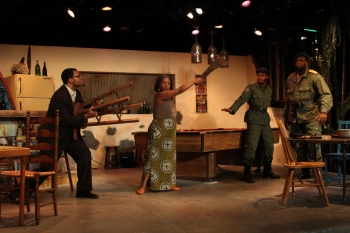“Ruined” Play Showcases the Story of Survival
Mike Harris, Sahirah Johnson, David Paul, David Oshioma in play “Ruined”
By Jennifer Deligne
“Ruined,” a play directed by Kean professor Ernest Wiggins, focuses on the topic of rape in mid-war Congo and was featured several nights in mid-November in the Zella J. Frye Theatre, with performers having a heavy storyline to portray.
The performance exuded raw emotions and explained mental battles that many women in Congo go through from being “ruined.”
For a woman in Congo, being ruined is to have a genital mutilation done to her sexual organs. This is a trauma many women face during the war, which leaves them with both physical and mental scars.
The war surrounding natural resources was a factor that began the war against women in Congo. Playwright Lynn Nottage wanted to share the story from the women’s perspective and explore the wars they fought due to their gender.
Many women were kidnapped, torn from their families and forced into trafficking. The play focused on women who lived and worked in a brothel to escape the forces of rape and sexual abuse.
Salima, a character based on a real survivor, cried for her murdered baby on stage and expressed scenes too gruesome to speak of.
Actors portrayed the violence the characters experienced through their physical demeanor.
Sophie, a ruined girl, walked as though in pain and was a walking symbol for women in Congo. Her emotional trauma was painted on her face and did not want to be attached with the sexual instances in the brothel.
Soldiers frequented the brothel and had their way with the women who were once tortured and forced into these acts not too long before. The strength to work in a brothel, despite what these women went through, is what Nottage wanted to demonstrate in her play. These women were not victims, but survivors with a story.
The play was set in a bright atmosphere with soft music playing throughout, which elevated during points where dancing and entertainment were done in the brothel.
The owner, character Mama Nadi, was an opinionated woman who herself has been ruined. She did not let this weaken her, it rather empowered her instead. She was a strong woman who encouraged the girls she cared for to be resilient towards the sorrows that working at a brothel brought.
The actors behind each character understood their parts in the play and used their voices to show control, sadness, fear and anger.
It was an emotionally fired performance with topics that were expressed so that the audience would be more aware of the wars waged within the war on natural resources. This play evoked compassion and told a story not often told, one based on hope and survival.


You must be logged in to post a comment.